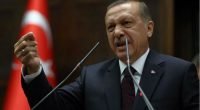Turkey’s New Constitution Would End Its Democracy

Date posted: January 25, 2017
Noah Feldman
With all eyes on the U.S. as it inaugurates a new leader, Turkey is preparing to amend its constitution to make its president even more powerful than the American executive.
There’s nothing inherently wrong with replacing parliamentary government with a presidential system. The problem is timing and context: Turkey’s proposed changes, which will go to a national referendum after being approved by parliament, follow the unsuccessful coup against increasingly autocratic President Recep Tayyip Erdogan.
In practice, a revised constitution would make it much easier for Erdogan to consolidate power entirely, taking Turkey out of the democratic column and making it into a dictatorship, pure and simple.
A further proposed change sought by Erdogan’s AK Party is to give the president power over the High Council of Judges and Prosecutors. Erdogan has already effectively taken control by purging that body in the aftermath of the coup. The proposed amendments would make that control permanent.
The proposed constitutional revision has lots of moving parts. But the most important is to transform Turkey’s modified parliamentary system into a presidential one. The president’s powers now are, in principle, much more limited. He governs alongside a prime minister chosen by the parliamentary majority, who in turn appoints a cabinet that’s responsible to parliament. An important practical and symbolic mechanism of parliamentary oversight of the government is the right of parliament to demand that cabinet ministers appear before it to answer inquiries — a right known as “interpellation.”
The new draft would shift the basic structure of the system by abolishing the office of prime minister and giving the president the authority to appoint the members of the cabinet. As part of this change, the parliament’s right to interpellate cabinet ministers would be removed.
Americans would find that aspect of the change unremarkable. The U.S. president appoints his own cabinet, albeit with the advice and consent of the Senate. Cabinet secretaries appear before Congress by courtesy, not by an inherent congressional right to question them.
In practice, a revised constitution would make it much easier for Erdogan to consolidate power entirely, taking Turkey out of the democratic column and making it into a dictatorship, pure and simple.
But the proposed Turkish Constitution goes further still in allowing the president to be the head of a political party. That means the president could exercise direct control over what candidates his party runs for office. Erdogan could handpick parliamentarians from his own party, who would be extremely unlikely to exercise a check over him, because he could also kick them out of the party.
In practice, of course, the U.S. president is also the head of the party to which he belongs. But in the U.S. system, that doesn’t give him the authority to pick congressional candidates. That power lies with primary voters, donors and party leaders.
Under the changed system, Turkish presidential elections would take place at the same time as parliamentary elections, every five years. That would make it difficult for voters to express dissension at the national level during the president’s term, because there would be no midterm elections.
A further proposed change sought by Erdogan’s AK Party is to give the president power over the High Council of Judges and Prosecutors. Erdogan has already effectively taken control by purging that body in the aftermath of the coup. The proposed amendments would make that control permanent.
In the U.S. presidential system, of course, the executive appoints federal judges and senior federal prosecutors. As long as they subsequently serve their terms on good behavior, they can function relatively independently. The trouble is that, as Erdogan’s purge shows, there’s no similar long-term guarantee of de facto independence in the Turkish system. Erdogan’s judges and prosecutors would be seen as political functionaries, and might well actually be subordinate to the executive. A proposed nominal guarantee of judicial and prosecutorial “impartiality” is only as good as political reality makes it.
Perhaps the most clever and pernicious element of the proposed change is that it limits the president to two terms — but only starting with ratification and new elections. That would allow Erdogan to remain in power until 2029, when he’ll be 75. By then he would have been running Turkey as prime minister or president for a whopping 26 years. That’s not a recipe for democracy, to put it mildly.
The entire reform package must pass the parliament with 330 votes out of 550. The ruling AK Party doesn’t have enough votes on its own, but it can reach the threshold by getting the votes of the nationalist, far-right MH Party. Then the package would go to a referendum.
In 2010, Turkish voters approved constitutional reforms pushed by the AK Party, by 58 percent to 42 percent. The vote is unlikely to be so lopsided this time. In practice, the vote will be a referendum on Erdogan himself.
Perhaps the most clever and pernicious element of the proposed change is that it limits the president to two terms — but only starting with ratification and new elections. That would allow Erdogan to remain in power until 2029, when he’ll be 75. By then he would have been running Turkey as prime minister or president for a whopping 26 years. That’s not a recipe for democracy, to put it mildly.
Absent the failed coup, it seems conceivable that Erdogan could have lost a bid to make Turkey into a presidential system designed to maximize his power. But the coup unfortunately provides ammunition for the argument that he needs greater authority to run the country.
If the presidential change prevails in Turkey, and is used to subvert democracy still further, it will contribute to the perception in many places that the presidential form of government is simply a prelude to autocracy. Traditionally, the U.S. system has stood as a bulwark against those arguments. Whether it remains so is the most significant question of Donald Trump’s presidency that has just begun.
Source: Bloomberg , January 22, 2017
Tags: Democracy | New constitution in Turkey | Turkey |
























